MBA 8000 Assignment 1: Ethical Dilemmas in Financial Leadership
VerifiedAdded on 2024/07/29
|8
|2472
|184
Essay
AI Summary
This essay presents a critical reflection on an ethical dilemma encountered by a financial officer, Mr. Pinto Smith, in an Australian home furnishing company. Mr. Pinto discovers that the CEO, Mr. Oliver, has engaged in tax evasion by concealing personal purchases as company expenses. The essay analyzes Mr. Pinto's ethical dilemma using normative ethical theories, specifically Utilitarianism and Kant's Non-Consequentialist Theory, to evaluate his decision to inform the owners of the company. The reflection explores the potential consequences of different actions, such as informing the tax authorities directly, and considers the impact on the company's reputation and Mr. Pinto's personal integrity. The essay concludes by evaluating the happier results of the decision made by Mr. Pinto.
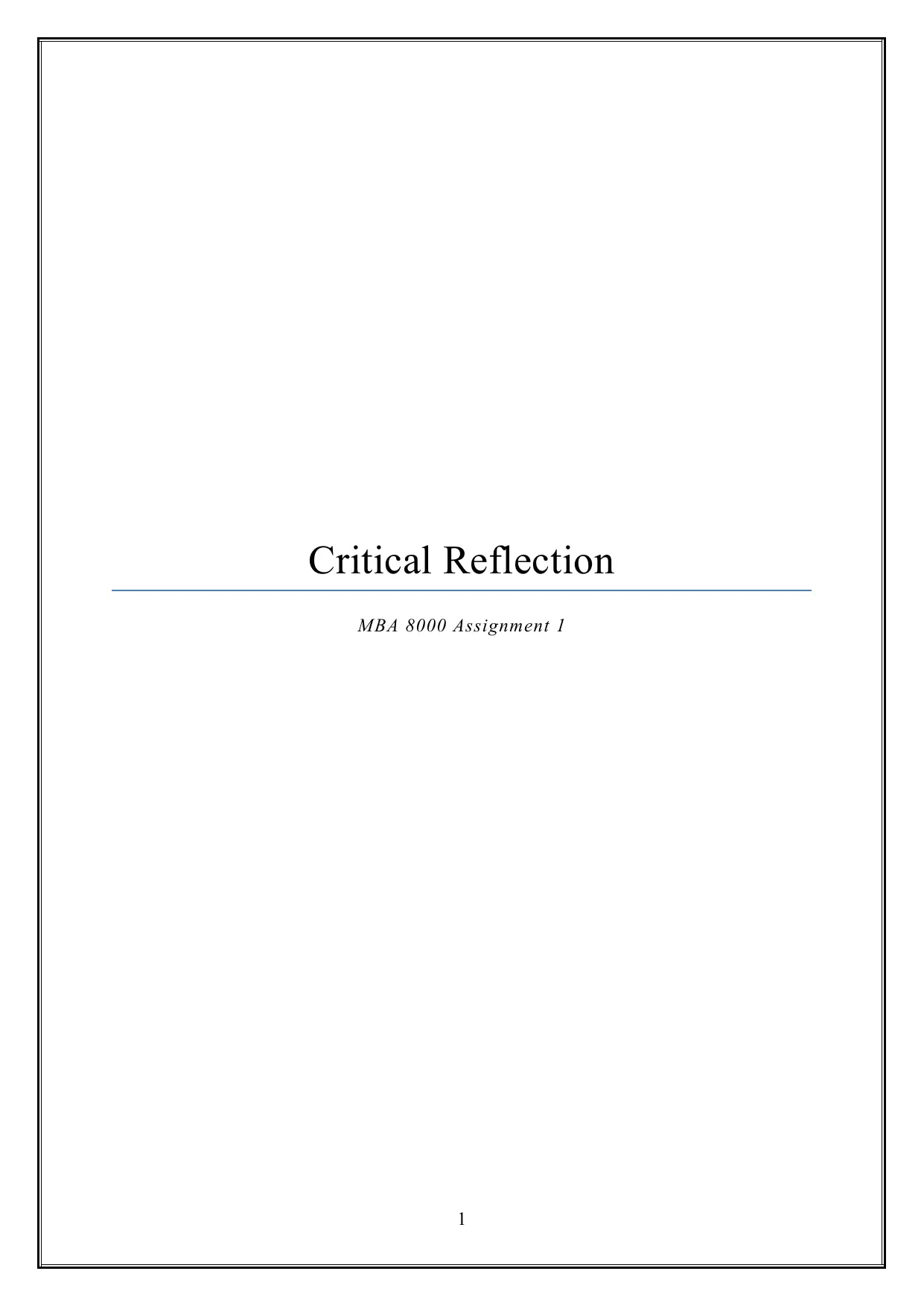
Critical Reflection
MBA 8000 Assignment 1
1
MBA 8000 Assignment 1
1
Paraphrase This Document
Need a fresh take? Get an instant paraphrase of this document with our AI Paraphraser
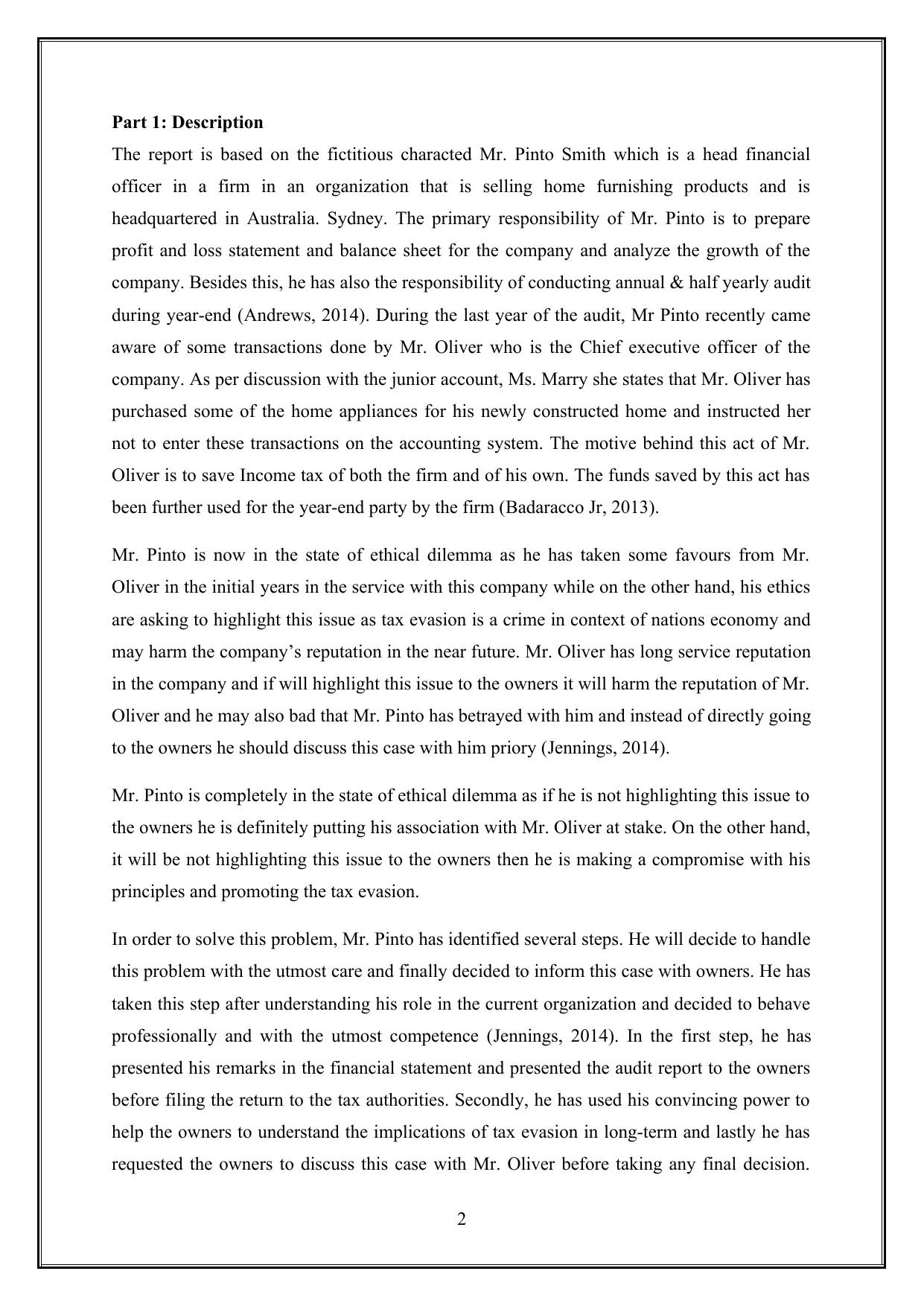
Part 1: Description
The report is based on the fictitious characted Mr. Pinto Smith which is a head financial
officer in a firm in an organization that is selling home furnishing products and is
headquartered in Australia. Sydney. The primary responsibility of Mr. Pinto is to prepare
profit and loss statement and balance sheet for the company and analyze the growth of the
company. Besides this, he has also the responsibility of conducting annual & half yearly audit
during year-end (Andrews, 2014). During the last year of the audit, Mr Pinto recently came
aware of some transactions done by Mr. Oliver who is the Chief executive officer of the
company. As per discussion with the junior account, Ms. Marry she states that Mr. Oliver has
purchased some of the home appliances for his newly constructed home and instructed her
not to enter these transactions on the accounting system. The motive behind this act of Mr.
Oliver is to save Income tax of both the firm and of his own. The funds saved by this act has
been further used for the year-end party by the firm (Badaracco Jr, 2013).
Mr. Pinto is now in the state of ethical dilemma as he has taken some favours from Mr.
Oliver in the initial years in the service with this company while on the other hand, his ethics
are asking to highlight this issue as tax evasion is a crime in context of nations economy and
may harm the company’s reputation in the near future. Mr. Oliver has long service reputation
in the company and if will highlight this issue to the owners it will harm the reputation of Mr.
Oliver and he may also bad that Mr. Pinto has betrayed with him and instead of directly going
to the owners he should discuss this case with him priory (Jennings, 2014).
Mr. Pinto is completely in the state of ethical dilemma as if he is not highlighting this issue to
the owners he is definitely putting his association with Mr. Oliver at stake. On the other hand,
it will be not highlighting this issue to the owners then he is making a compromise with his
principles and promoting the tax evasion.
In order to solve this problem, Mr. Pinto has identified several steps. He will decide to handle
this problem with the utmost care and finally decided to inform this case with owners. He has
taken this step after understanding his role in the current organization and decided to behave
professionally and with the utmost competence (Jennings, 2014). In the first step, he has
presented his remarks in the financial statement and presented the audit report to the owners
before filing the return to the tax authorities. Secondly, he has used his convincing power to
help the owners to understand the implications of tax evasion in long-term and lastly he has
requested the owners to discuss this case with Mr. Oliver before taking any final decision.
2
The report is based on the fictitious characted Mr. Pinto Smith which is a head financial
officer in a firm in an organization that is selling home furnishing products and is
headquartered in Australia. Sydney. The primary responsibility of Mr. Pinto is to prepare
profit and loss statement and balance sheet for the company and analyze the growth of the
company. Besides this, he has also the responsibility of conducting annual & half yearly audit
during year-end (Andrews, 2014). During the last year of the audit, Mr Pinto recently came
aware of some transactions done by Mr. Oliver who is the Chief executive officer of the
company. As per discussion with the junior account, Ms. Marry she states that Mr. Oliver has
purchased some of the home appliances for his newly constructed home and instructed her
not to enter these transactions on the accounting system. The motive behind this act of Mr.
Oliver is to save Income tax of both the firm and of his own. The funds saved by this act has
been further used for the year-end party by the firm (Badaracco Jr, 2013).
Mr. Pinto is now in the state of ethical dilemma as he has taken some favours from Mr.
Oliver in the initial years in the service with this company while on the other hand, his ethics
are asking to highlight this issue as tax evasion is a crime in context of nations economy and
may harm the company’s reputation in the near future. Mr. Oliver has long service reputation
in the company and if will highlight this issue to the owners it will harm the reputation of Mr.
Oliver and he may also bad that Mr. Pinto has betrayed with him and instead of directly going
to the owners he should discuss this case with him priory (Jennings, 2014).
Mr. Pinto is completely in the state of ethical dilemma as if he is not highlighting this issue to
the owners he is definitely putting his association with Mr. Oliver at stake. On the other hand,
it will be not highlighting this issue to the owners then he is making a compromise with his
principles and promoting the tax evasion.
In order to solve this problem, Mr. Pinto has identified several steps. He will decide to handle
this problem with the utmost care and finally decided to inform this case with owners. He has
taken this step after understanding his role in the current organization and decided to behave
professionally and with the utmost competence (Jennings, 2014). In the first step, he has
presented his remarks in the financial statement and presented the audit report to the owners
before filing the return to the tax authorities. Secondly, he has used his convincing power to
help the owners to understand the implications of tax evasion in long-term and lastly he has
requested the owners to discuss this case with Mr. Oliver before taking any final decision.
2
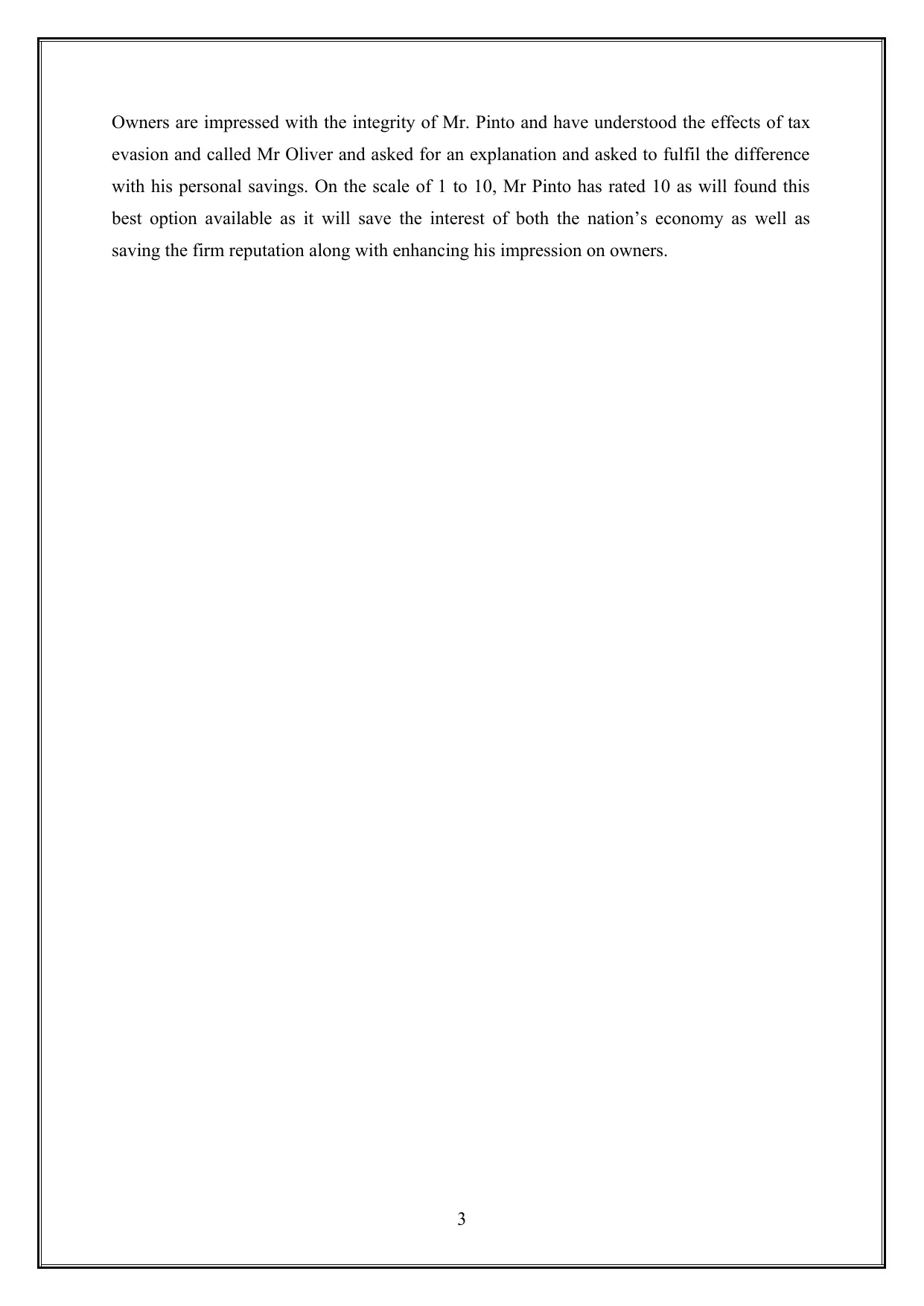
Owners are impressed with the integrity of Mr. Pinto and have understood the effects of tax
evasion and called Mr Oliver and asked for an explanation and asked to fulfil the difference
with his personal savings. On the scale of 1 to 10, Mr Pinto has rated 10 as will found this
best option available as it will save the interest of both the nation’s economy as well as
saving the firm reputation along with enhancing his impression on owners.
3
evasion and called Mr Oliver and asked for an explanation and asked to fulfil the difference
with his personal savings. On the scale of 1 to 10, Mr Pinto has rated 10 as will found this
best option available as it will save the interest of both the nation’s economy as well as
saving the firm reputation along with enhancing his impression on owners.
3
⊘ This is a preview!⊘
Do you want full access?
Subscribe today to unlock all pages.

Trusted by 1+ million students worldwide
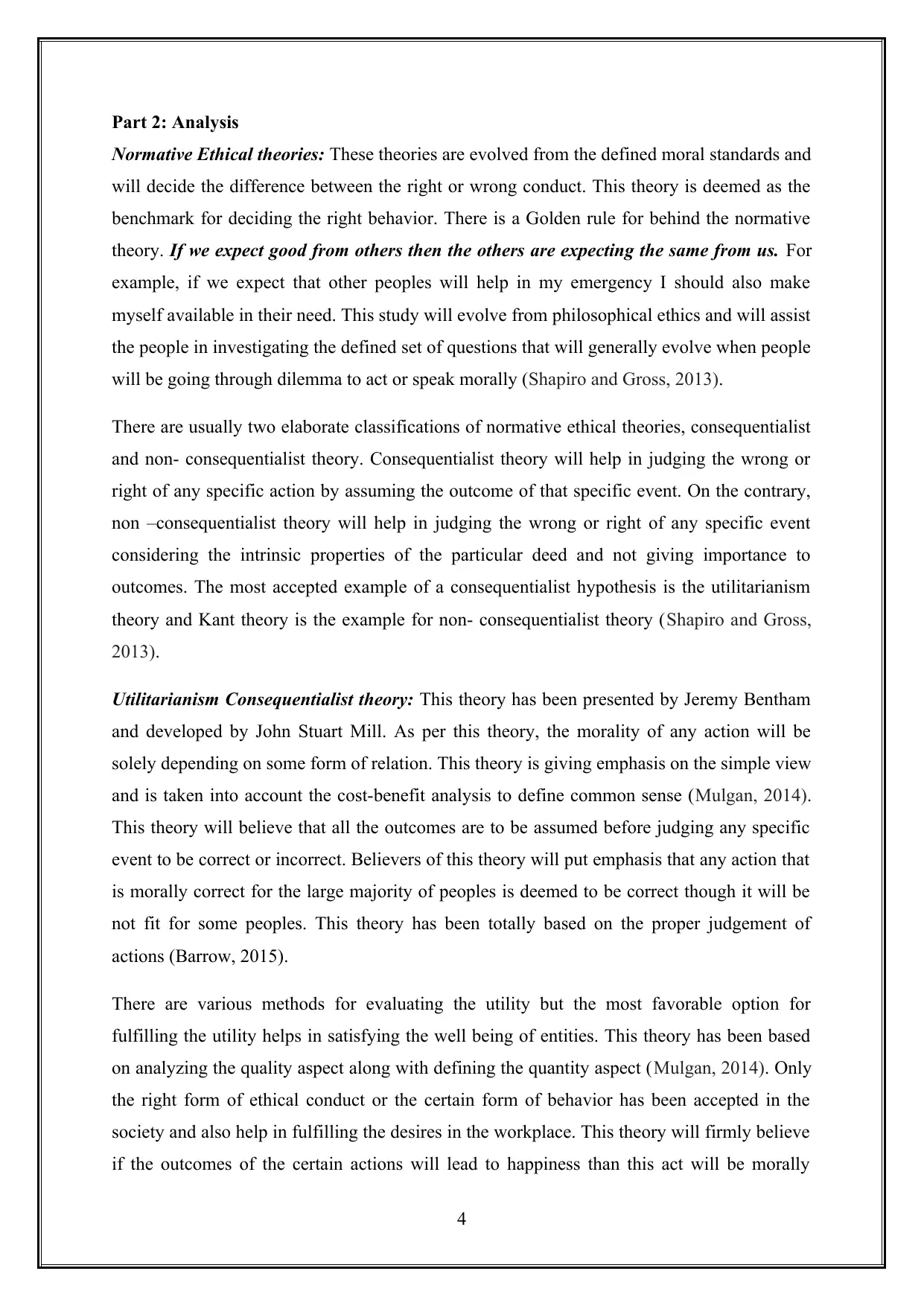
Part 2: Analysis
Normative Ethical theories: These theories are evolved from the defined moral standards and
will decide the difference between the right or wrong conduct. This theory is deemed as the
benchmark for deciding the right behavior. There is a Golden rule for behind the normative
theory. If we expect good from others then the others are expecting the same from us. For
example, if we expect that other peoples will help in my emergency I should also make
myself available in their need. This study will evolve from philosophical ethics and will assist
the people in investigating the defined set of questions that will generally evolve when people
will be going through dilemma to act or speak morally (Shapiro and Gross, 2013).
There are usually two elaborate classifications of normative ethical theories, consequentialist
and non- consequentialist theory. Consequentialist theory will help in judging the wrong or
right of any specific action by assuming the outcome of that specific event. On the contrary,
non –consequentialist theory will help in judging the wrong or right of any specific event
considering the intrinsic properties of the particular deed and not giving importance to
outcomes. The most accepted example of a consequentialist hypothesis is the utilitarianism
theory and Kant theory is the example for non- consequentialist theory (Shapiro and Gross,
2013).
Utilitarianism Consequentialist theory: This theory has been presented by Jeremy Bentham
and developed by John Stuart Mill. As per this theory, the morality of any action will be
solely depending on some form of relation. This theory is giving emphasis on the simple view
and is taken into account the cost-benefit analysis to define common sense (Mulgan, 2014).
This theory will believe that all the outcomes are to be assumed before judging any specific
event to be correct or incorrect. Believers of this theory will put emphasis that any action that
is morally correct for the large majority of peoples is deemed to be correct though it will be
not fit for some peoples. This theory has been totally based on the proper judgement of
actions (Barrow, 2015).
There are various methods for evaluating the utility but the most favorable option for
fulfilling the utility helps in satisfying the well being of entities. This theory has been based
on analyzing the quality aspect along with defining the quantity aspect (Mulgan, 2014). Only
the right form of ethical conduct or the certain form of behavior has been accepted in the
society and also help in fulfilling the desires in the workplace. This theory will firmly believe
if the outcomes of the certain actions will lead to happiness than this act will be morally
4
Normative Ethical theories: These theories are evolved from the defined moral standards and
will decide the difference between the right or wrong conduct. This theory is deemed as the
benchmark for deciding the right behavior. There is a Golden rule for behind the normative
theory. If we expect good from others then the others are expecting the same from us. For
example, if we expect that other peoples will help in my emergency I should also make
myself available in their need. This study will evolve from philosophical ethics and will assist
the people in investigating the defined set of questions that will generally evolve when people
will be going through dilemma to act or speak morally (Shapiro and Gross, 2013).
There are usually two elaborate classifications of normative ethical theories, consequentialist
and non- consequentialist theory. Consequentialist theory will help in judging the wrong or
right of any specific action by assuming the outcome of that specific event. On the contrary,
non –consequentialist theory will help in judging the wrong or right of any specific event
considering the intrinsic properties of the particular deed and not giving importance to
outcomes. The most accepted example of a consequentialist hypothesis is the utilitarianism
theory and Kant theory is the example for non- consequentialist theory (Shapiro and Gross,
2013).
Utilitarianism Consequentialist theory: This theory has been presented by Jeremy Bentham
and developed by John Stuart Mill. As per this theory, the morality of any action will be
solely depending on some form of relation. This theory is giving emphasis on the simple view
and is taken into account the cost-benefit analysis to define common sense (Mulgan, 2014).
This theory will believe that all the outcomes are to be assumed before judging any specific
event to be correct or incorrect. Believers of this theory will put emphasis that any action that
is morally correct for the large majority of peoples is deemed to be correct though it will be
not fit for some peoples. This theory has been totally based on the proper judgement of
actions (Barrow, 2015).
There are various methods for evaluating the utility but the most favorable option for
fulfilling the utility helps in satisfying the well being of entities. This theory has been based
on analyzing the quality aspect along with defining the quantity aspect (Mulgan, 2014). Only
the right form of ethical conduct or the certain form of behavior has been accepted in the
society and also help in fulfilling the desires in the workplace. This theory will firmly believe
if the outcomes of the certain actions will lead to happiness than this act will be morally
4
Paraphrase This Document
Need a fresh take? Get an instant paraphrase of this document with our AI Paraphraser
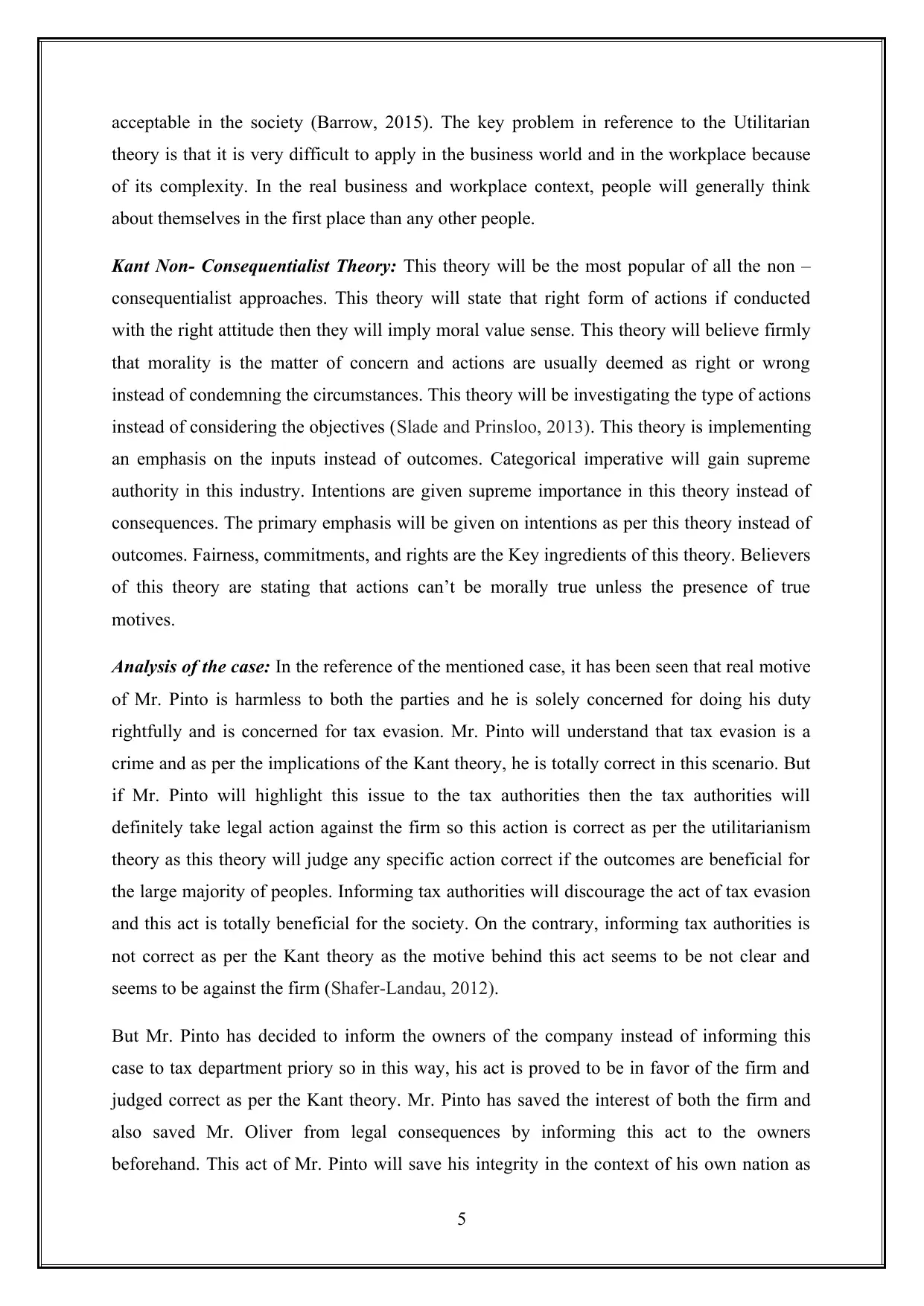
acceptable in the society (Barrow, 2015). The key problem in reference to the Utilitarian
theory is that it is very difficult to apply in the business world and in the workplace because
of its complexity. In the real business and workplace context, people will generally think
about themselves in the first place than any other people.
Kant Non- Consequentialist Theory: This theory will be the most popular of all the non –
consequentialist approaches. This theory will state that right form of actions if conducted
with the right attitude then they will imply moral value sense. This theory will believe firmly
that morality is the matter of concern and actions are usually deemed as right or wrong
instead of condemning the circumstances. This theory will be investigating the type of actions
instead of considering the objectives (Slade and Prinsloo, 2013). This theory is implementing
an emphasis on the inputs instead of outcomes. Categorical imperative will gain supreme
authority in this industry. Intentions are given supreme importance in this theory instead of
consequences. The primary emphasis will be given on intentions as per this theory instead of
outcomes. Fairness, commitments, and rights are the Key ingredients of this theory. Believers
of this theory are stating that actions can’t be morally true unless the presence of true
motives.
Analysis of the case: In the reference of the mentioned case, it has been seen that real motive
of Mr. Pinto is harmless to both the parties and he is solely concerned for doing his duty
rightfully and is concerned for tax evasion. Mr. Pinto will understand that tax evasion is a
crime and as per the implications of the Kant theory, he is totally correct in this scenario. But
if Mr. Pinto will highlight this issue to the tax authorities then the tax authorities will
definitely take legal action against the firm so this action is correct as per the utilitarianism
theory as this theory will judge any specific action correct if the outcomes are beneficial for
the large majority of peoples. Informing tax authorities will discourage the act of tax evasion
and this act is totally beneficial for the society. On the contrary, informing tax authorities is
not correct as per the Kant theory as the motive behind this act seems to be not clear and
seems to be against the firm (Shafer-Landau, 2012).
But Mr. Pinto has decided to inform the owners of the company instead of informing this
case to tax department priory so in this way, his act is proved to be in favor of the firm and
judged correct as per the Kant theory. Mr. Pinto has saved the interest of both the firm and
also saved Mr. Oliver from legal consequences by informing this act to the owners
beforehand. This act of Mr. Pinto will save his integrity in the context of his own nation as
5
theory is that it is very difficult to apply in the business world and in the workplace because
of its complexity. In the real business and workplace context, people will generally think
about themselves in the first place than any other people.
Kant Non- Consequentialist Theory: This theory will be the most popular of all the non –
consequentialist approaches. This theory will state that right form of actions if conducted
with the right attitude then they will imply moral value sense. This theory will believe firmly
that morality is the matter of concern and actions are usually deemed as right or wrong
instead of condemning the circumstances. This theory will be investigating the type of actions
instead of considering the objectives (Slade and Prinsloo, 2013). This theory is implementing
an emphasis on the inputs instead of outcomes. Categorical imperative will gain supreme
authority in this industry. Intentions are given supreme importance in this theory instead of
consequences. The primary emphasis will be given on intentions as per this theory instead of
outcomes. Fairness, commitments, and rights are the Key ingredients of this theory. Believers
of this theory are stating that actions can’t be morally true unless the presence of true
motives.
Analysis of the case: In the reference of the mentioned case, it has been seen that real motive
of Mr. Pinto is harmless to both the parties and he is solely concerned for doing his duty
rightfully and is concerned for tax evasion. Mr. Pinto will understand that tax evasion is a
crime and as per the implications of the Kant theory, he is totally correct in this scenario. But
if Mr. Pinto will highlight this issue to the tax authorities then the tax authorities will
definitely take legal action against the firm so this action is correct as per the utilitarianism
theory as this theory will judge any specific action correct if the outcomes are beneficial for
the large majority of peoples. Informing tax authorities will discourage the act of tax evasion
and this act is totally beneficial for the society. On the contrary, informing tax authorities is
not correct as per the Kant theory as the motive behind this act seems to be not clear and
seems to be against the firm (Shafer-Landau, 2012).
But Mr. Pinto has decided to inform the owners of the company instead of informing this
case to tax department priory so in this way, his act is proved to be in favor of the firm and
judged correct as per the Kant theory. Mr. Pinto has saved the interest of both the firm and
also saved Mr. Oliver from legal consequences by informing this act to the owners
beforehand. This act of Mr. Pinto will save his integrity in the context of his own nation as
5
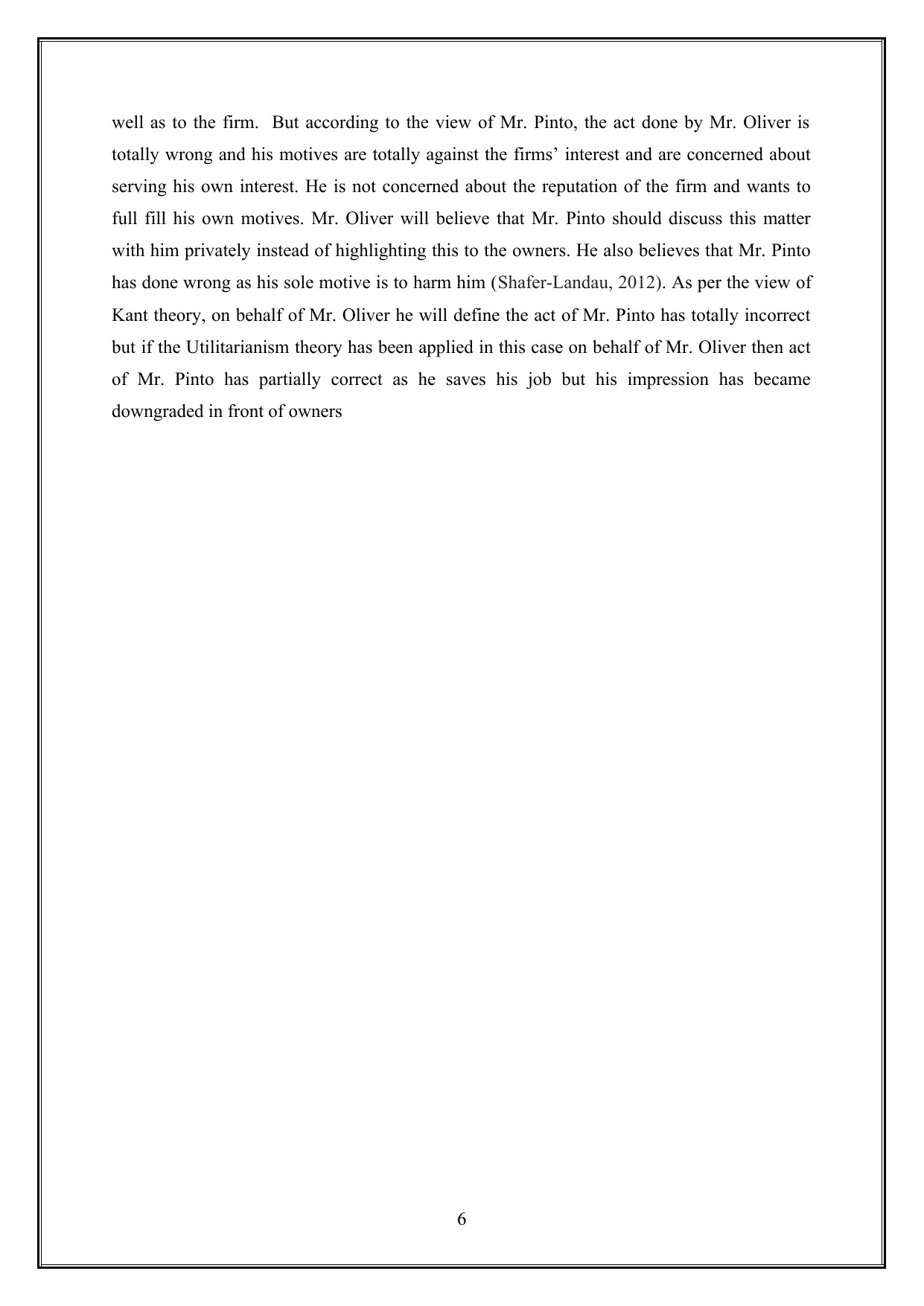
well as to the firm. But according to the view of Mr. Pinto, the act done by Mr. Oliver is
totally wrong and his motives are totally against the firms’ interest and are concerned about
serving his own interest. He is not concerned about the reputation of the firm and wants to
full fill his own motives. Mr. Oliver will believe that Mr. Pinto should discuss this matter
with him privately instead of highlighting this to the owners. He also believes that Mr. Pinto
has done wrong as his sole motive is to harm him (Shafer-Landau, 2012). As per the view of
Kant theory, on behalf of Mr. Oliver he will define the act of Mr. Pinto has totally incorrect
but if the Utilitarianism theory has been applied in this case on behalf of Mr. Oliver then act
of Mr. Pinto has partially correct as he saves his job but his impression has became
downgraded in front of owners
6
totally wrong and his motives are totally against the firms’ interest and are concerned about
serving his own interest. He is not concerned about the reputation of the firm and wants to
full fill his own motives. Mr. Oliver will believe that Mr. Pinto should discuss this matter
with him privately instead of highlighting this to the owners. He also believes that Mr. Pinto
has done wrong as his sole motive is to harm him (Shafer-Landau, 2012). As per the view of
Kant theory, on behalf of Mr. Oliver he will define the act of Mr. Pinto has totally incorrect
but if the Utilitarianism theory has been applied in this case on behalf of Mr. Oliver then act
of Mr. Pinto has partially correct as he saves his job but his impression has became
downgraded in front of owners
6
⊘ This is a preview!⊘
Do you want full access?
Subscribe today to unlock all pages.

Trusted by 1+ million students worldwide
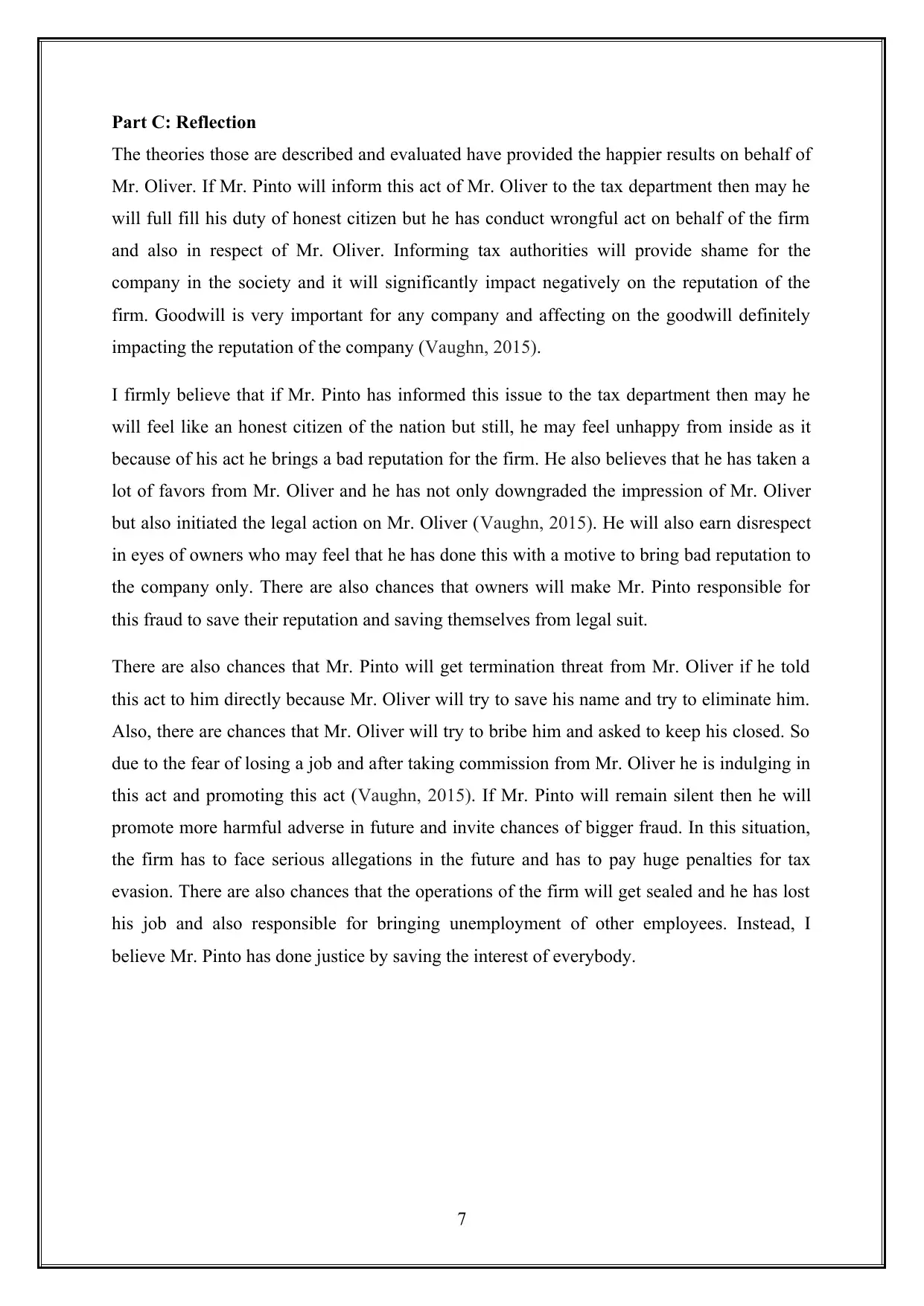
Part C: Reflection
The theories those are described and evaluated have provided the happier results on behalf of
Mr. Oliver. If Mr. Pinto will inform this act of Mr. Oliver to the tax department then may he
will full fill his duty of honest citizen but he has conduct wrongful act on behalf of the firm
and also in respect of Mr. Oliver. Informing tax authorities will provide shame for the
company in the society and it will significantly impact negatively on the reputation of the
firm. Goodwill is very important for any company and affecting on the goodwill definitely
impacting the reputation of the company (Vaughn, 2015).
I firmly believe that if Mr. Pinto has informed this issue to the tax department then may he
will feel like an honest citizen of the nation but still, he may feel unhappy from inside as it
because of his act he brings a bad reputation for the firm. He also believes that he has taken a
lot of favors from Mr. Oliver and he has not only downgraded the impression of Mr. Oliver
but also initiated the legal action on Mr. Oliver (Vaughn, 2015). He will also earn disrespect
in eyes of owners who may feel that he has done this with a motive to bring bad reputation to
the company only. There are also chances that owners will make Mr. Pinto responsible for
this fraud to save their reputation and saving themselves from legal suit.
There are also chances that Mr. Pinto will get termination threat from Mr. Oliver if he told
this act to him directly because Mr. Oliver will try to save his name and try to eliminate him.
Also, there are chances that Mr. Oliver will try to bribe him and asked to keep his closed. So
due to the fear of losing a job and after taking commission from Mr. Oliver he is indulging in
this act and promoting this act (Vaughn, 2015). If Mr. Pinto will remain silent then he will
promote more harmful adverse in future and invite chances of bigger fraud. In this situation,
the firm has to face serious allegations in the future and has to pay huge penalties for tax
evasion. There are also chances that the operations of the firm will get sealed and he has lost
his job and also responsible for bringing unemployment of other employees. Instead, I
believe Mr. Pinto has done justice by saving the interest of everybody.
7
The theories those are described and evaluated have provided the happier results on behalf of
Mr. Oliver. If Mr. Pinto will inform this act of Mr. Oliver to the tax department then may he
will full fill his duty of honest citizen but he has conduct wrongful act on behalf of the firm
and also in respect of Mr. Oliver. Informing tax authorities will provide shame for the
company in the society and it will significantly impact negatively on the reputation of the
firm. Goodwill is very important for any company and affecting on the goodwill definitely
impacting the reputation of the company (Vaughn, 2015).
I firmly believe that if Mr. Pinto has informed this issue to the tax department then may he
will feel like an honest citizen of the nation but still, he may feel unhappy from inside as it
because of his act he brings a bad reputation for the firm. He also believes that he has taken a
lot of favors from Mr. Oliver and he has not only downgraded the impression of Mr. Oliver
but also initiated the legal action on Mr. Oliver (Vaughn, 2015). He will also earn disrespect
in eyes of owners who may feel that he has done this with a motive to bring bad reputation to
the company only. There are also chances that owners will make Mr. Pinto responsible for
this fraud to save their reputation and saving themselves from legal suit.
There are also chances that Mr. Pinto will get termination threat from Mr. Oliver if he told
this act to him directly because Mr. Oliver will try to save his name and try to eliminate him.
Also, there are chances that Mr. Oliver will try to bribe him and asked to keep his closed. So
due to the fear of losing a job and after taking commission from Mr. Oliver he is indulging in
this act and promoting this act (Vaughn, 2015). If Mr. Pinto will remain silent then he will
promote more harmful adverse in future and invite chances of bigger fraud. In this situation,
the firm has to face serious allegations in the future and has to pay huge penalties for tax
evasion. There are also chances that the operations of the firm will get sealed and he has lost
his job and also responsible for bringing unemployment of other employees. Instead, I
believe Mr. Pinto has done justice by saving the interest of everybody.
7
Paraphrase This Document
Need a fresh take? Get an instant paraphrase of this document with our AI Paraphraser
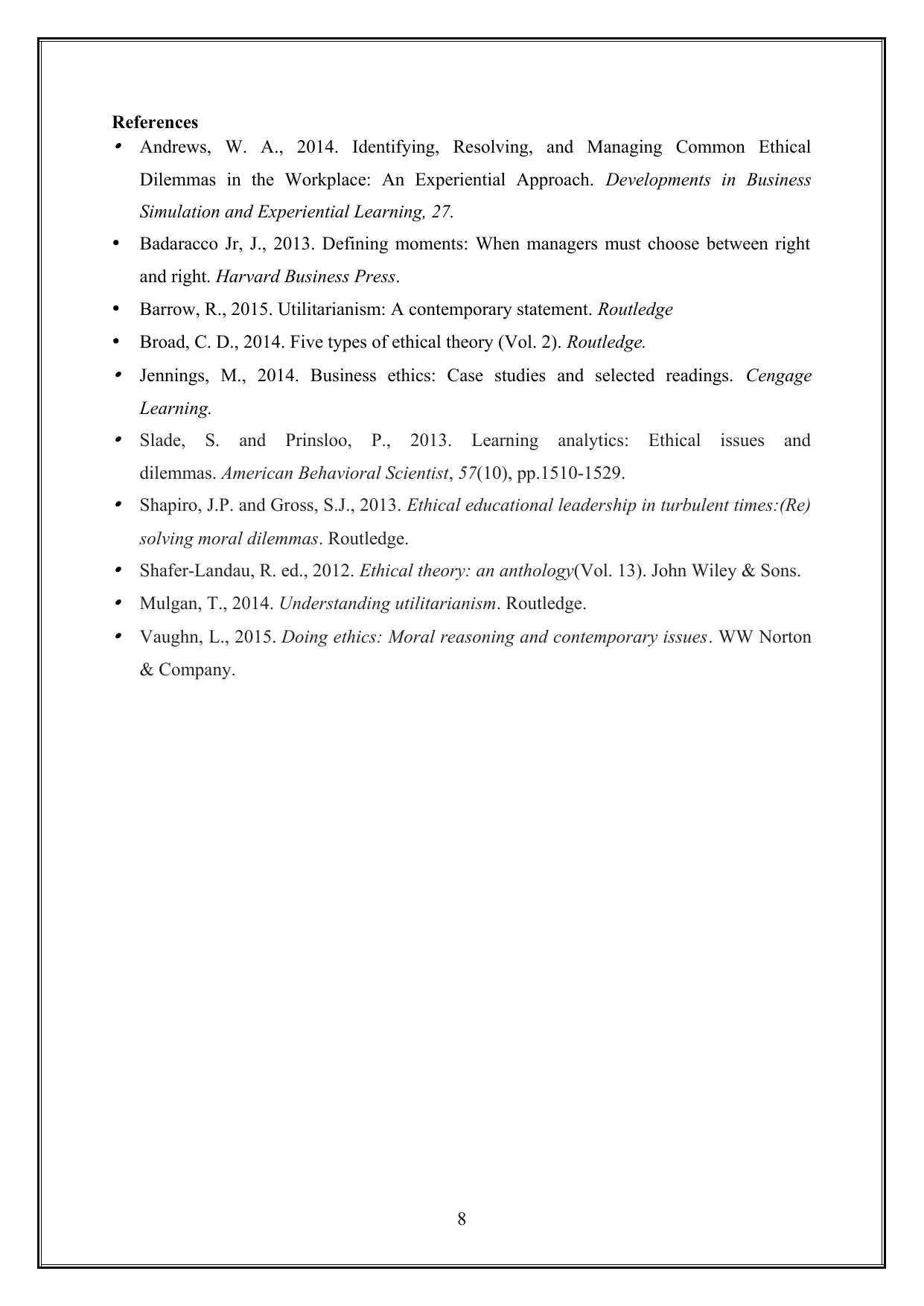
References
Andrews, W. A., 2014. Identifying, Resolving, and Managing Common Ethical
Dilemmas in the Workplace: An Experiential Approach. Developments in Business
Simulation and Experiential Learning, 27.
Badaracco Jr, J., 2013. Defining moments: When managers must choose between right
and right. Harvard Business Press.
Barrow, R., 2015. Utilitarianism: A contemporary statement. Routledge
Broad, C. D., 2014. Five types of ethical theory (Vol. 2). Routledge. Jennings, M., 2014. Business ethics: Case studies and selected readings. Cengage
Learning. Slade, S. and Prinsloo, P., 2013. Learning analytics: Ethical issues and
dilemmas. American Behavioral Scientist, 57(10), pp.1510-1529. Shapiro, J.P. and Gross, S.J., 2013. Ethical educational leadership in turbulent times:(Re)
solving moral dilemmas. Routledge. Shafer-Landau, R. ed., 2012. Ethical theory: an anthology(Vol. 13). John Wiley & Sons. Mulgan, T., 2014. Understanding utilitarianism. Routledge. Vaughn, L., 2015. Doing ethics: Moral reasoning and contemporary issues. WW Norton
& Company.
8
Andrews, W. A., 2014. Identifying, Resolving, and Managing Common Ethical
Dilemmas in the Workplace: An Experiential Approach. Developments in Business
Simulation and Experiential Learning, 27.
Badaracco Jr, J., 2013. Defining moments: When managers must choose between right
and right. Harvard Business Press.
Barrow, R., 2015. Utilitarianism: A contemporary statement. Routledge
Broad, C. D., 2014. Five types of ethical theory (Vol. 2). Routledge. Jennings, M., 2014. Business ethics: Case studies and selected readings. Cengage
Learning. Slade, S. and Prinsloo, P., 2013. Learning analytics: Ethical issues and
dilemmas. American Behavioral Scientist, 57(10), pp.1510-1529. Shapiro, J.P. and Gross, S.J., 2013. Ethical educational leadership in turbulent times:(Re)
solving moral dilemmas. Routledge. Shafer-Landau, R. ed., 2012. Ethical theory: an anthology(Vol. 13). John Wiley & Sons. Mulgan, T., 2014. Understanding utilitarianism. Routledge. Vaughn, L., 2015. Doing ethics: Moral reasoning and contemporary issues. WW Norton
& Company.
8
1 out of 8
Related Documents
Your All-in-One AI-Powered Toolkit for Academic Success.
+13062052269
info@desklib.com
Available 24*7 on WhatsApp / Email
![[object Object]](/_next/static/media/star-bottom.7253800d.svg)
Unlock your academic potential
Copyright © 2020–2026 A2Z Services. All Rights Reserved. Developed and managed by ZUCOL.





